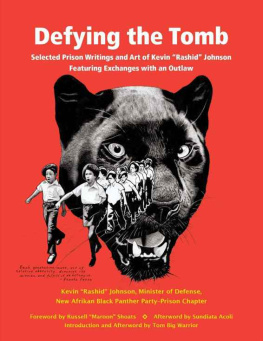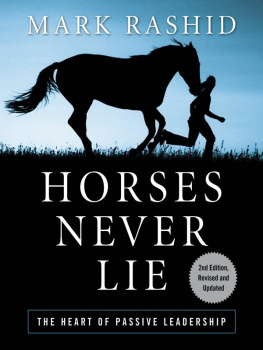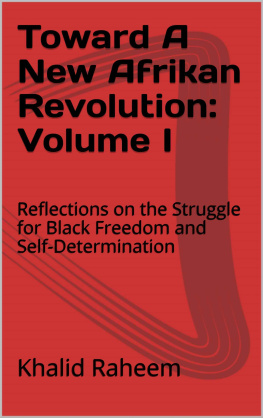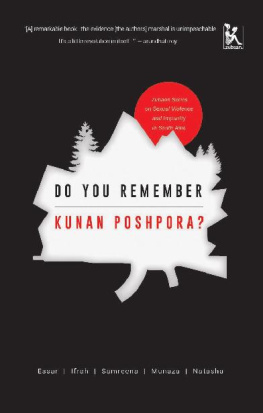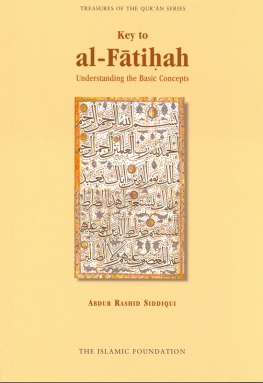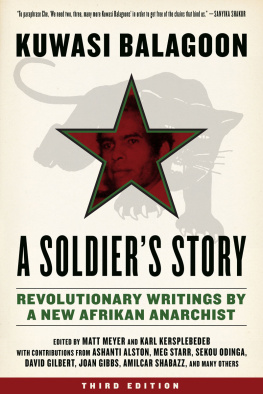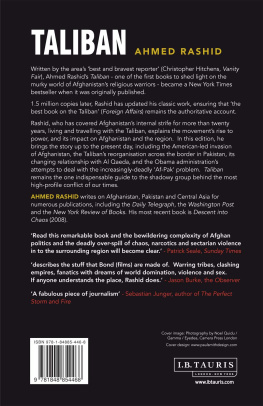Table of Contents
D efying
the Tomb
Selected Prison
Writings and Art of
Kevin Rashid Johnson
featuring exchanges
with an Outlaw
Defying the Tomb: Selected Prison Writings and Art of Kevin Rashid Johnson, Featuring Exchanges With an Outlaw
ISBN 978-1-894946-77-3
Published in 2010 by Kersplebedeb, second printing 2013
Copyright Rising Sun Press
All rights reserved
Cover artwork by Rashid
Cover and interior design by Kersplebedeb
To order copies of the book, contact:
Kersplebedeb
CP 63560, CCCP Van Horne
Montreal, Quebec
Canada
H3W 3H8
Printed in canada.
Kevin Rashid Johnson is a New Afrikan Communist prison organizer and intellectual in the United States and one of the founders of the NABPP-PC (New Afrikan Black Panther PartyPrison Chapter). His writings, and updates on his situation, can be found on his website at http://www.rashidmod.com.
As Rashid is frequently transferred, in order to write to him please check out the website or write to Kersplebedeb to receive his most up-to-date address.
Dedicated to the People, to the veterans and fallen warriors of our centuries-old liberation struggle, to the first wave Black vanguard Black Panther Party, and to our martyred comrade, Hasan Shakur. It aint over yet! The struggle continues!!
All Power to the People!!
Each generation must, out of relative obscurity, discover its mission, and fulfill it or betray it.
Frantz Fanon
Foreword
by Russell Maroon Shoats

On being asked to write a foreword for this book, and after reading the manuscript, I became excited about contributing my views about the authors writings, ideology, life and work within the ongoing struggle for Black self-determination and against the universal plague of capitalism, that has advanced to the stage of a global fascist empire. Having been directly involved in similar efforts for close to 40 years, these are issues I care a lot about, and have also learned something about.
Ive been in prison since 1972, when I was convicted of participating in a retaliatory attack on a Philadelphia police station in 1970. That action was in response to the ongoing killings of local Black youth, and the generalized murderous suppression of the Black Movement for Self-Determination, and of the Black Panther Party (BPP) in particular. Having then been a member of an armed clandestine unit of the Black Liberation Army (BLA), or Afro-American Liberation Army which were one and the same we operated as the offensive arm of the BPP and of our movement in general.
My excitement was due to my belief that the work that our author and his close comrades are doing is pivotal to our ongoing struggle, leaving me very encouraged by these efforts. Yet, when I was earlier invited to join their fledgling New Afrikan Black Panther PartyPrison Chapter (NABPPPC), I declined. Now I know that sounds contradictory, and maybe a product of the ego, not wanting to follow younger comrades who were not even born when I first got involved in our struggle But at 63, with no immediate prospects of voluntarily being released from prison, Hell, Ive been in 23 hour lock-down for over 25 years, and serving over two natural life sentences plus Ive ducked so many police bullets, nightsticks and jailhouse shanks, as well as suffered through the deaths of so many comrades, relatives, associates and friends, until Ive long ago submerged my ego to a stronger desire to just continue to soldier on in whatever capacity I can; knowing that such a never-say-die attitude provides its own ego gratification, as well as provides encouragement and inspiration to help fuel our fight.
Ancestor Harriet Tubman used to say: Go free or die! Over time Ive come to see that, as she did; freedom from pride of place, deriving satisfaction from adhering to a cosmic set of ethics.
No, Ill explain why I declined their offer later on. But back to why the authors efforts are so important.
More than anything else, the author is interjecting some much needed revolutionary anti-capitalist views and class analysis into our contemporary efforts. Moreover, hes doing a lot of homework so that he can understand and pass on lessons learned by others who have also fought against this problem, helping him to better explain and struggle against various economic, political, and social phenomena that continue to vex many who desire and work towards revolutionary change. In fact, it has been so for millennia.
In Civilization or Barbarism, Cheikh Anta Diop informs us that as far back as three thousand or more years ago, the rebels against despotic rulers of ancient Egypt were never able to achieve their goals due to their inability to fully understand the various class strata that under-girded that society. More directly, the true forerunners of the NABPPPCs efforts would be best perceived as beginning with the kidnapping and enslavement of their Afrikan Ancestors from that continent, while modern capitalism was in its infancy. And ever since that time, there has been an internal ideological struggle taking place between various elements and factions of the Afrikans affected, both on the Afrikan continent and throughout the Diaspora. That struggle deals with how best to achieve freedom from slavery, as well as self-determination in the economic, political, social and cultural spheres; with the ending of slavery being the only aspect easily agreed upon.
In truth, similar struggles were also being waged against many of the same forces by other peoples on other continents. In political and social matters Afrikans everywhere wanted as much control and say over their lives as possible. Coming from societies where for centuries they had developed traditions that ameliorated much of the strife and antagonisms between classes mainly due to their ability to reject too much down pressure from the upper classes by simply migrating throughout the vast continent their political and social institutions relied more on consciousness building than anything else. This held true even amongst the large empires like Ghana, Mali, Songhai and the Ashanti: and even more so amongst the smaller states and the stateless societies found amongst the Ibo, Twa (pygmy), Sans (bushmen), Khoisan, Bantu and Niger/Congo peoples of west and southern Afrika. All of these were areas that provided the most kidnapped peoples who were enslaved in the Diaspora.
In economic matters, however, we return to where our author is so important. The forerunners of his NABPPPC in the Diaspora found a robust mercantilism which their enforced labor fueled that evolved over the centuries into mature capitalism/imperialism, the likes of which were unknown earlier: especially amongst their Afrikan Ancestors! Thus, instinctively, the need to exert ever more demands on the Afrikans, who tenaciously held onto remnants of their traditional communal institutions and practices, caused many hard pressed individuals and groups to try to come up with ways to try to synthesize their efforts to achieve freedom and self-determination within a capitalist framework. While others began to examine what certain Europeans who were wrestling with similar forms of capitalistic exploitation like Karl Marx and Fredrich Engels, and later V.I. Lenin were discovering. And that was their determination that capitalism at bottom was a predatory system that needed to be abolished.
We can clearly examine this struggle between liberationists in the New Afrikan Diaspora by studying the clash amongst the leaders and followers of Marcus Garveys United Negro Improvement Association and African Communities Leagues (UNIAACL) and the African Blood Brotherhood, led by Cyril Briggs, who were confirmed Marxists. Garvey, although its not generally known, organized and led the first and only Global Pan-Afrikanist Movement, with millions of members in both hemispheres. Garveys economic ideas and inspiration was derived from Booker T. Washingtons Black capitalism, which was best manifested through his Tuskegee Institute in the then segregated U.S. South.

